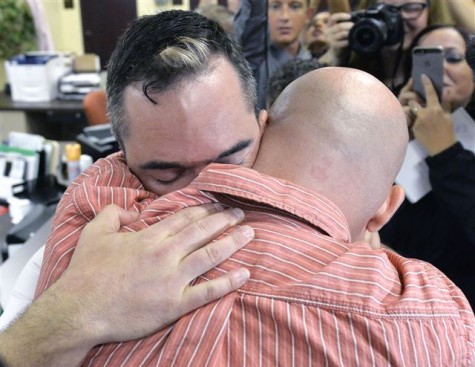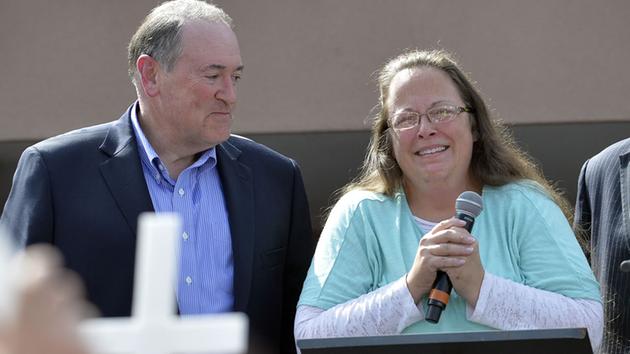Editorial: Kim Davis, religious freedom, and a secular society: where should we draw the line?
Rowan County Clerk Kim Davis, with Republican presidential candidate Mike Huckabee, left, at her side, speaks after being released from the Carter County Detention Center, Tuesday, Sept. 8, 2015, in Grayson, Ky. Davis, the Kentucky county clerk who was jailed for refusing to issue marriage licenses to gay couples, was released Tuesday after five days behind bars. (AP Photo/Timothy D. Easley)
September 16, 2015
“Congress shall make no law respecting an establishment of religion, or prohibiting the free exercise thereof…”
Thus begins arguably the most important document in American History: the Bill of Rights. The First Amendment, which, among other things, guarantees the right of all American citizens to practice their chosen faith without intervention or persecution, is often cited by (typically conservative) Christians in the United States when they feel their religion is being violated. Of course, that’s the purpose of the First Amendment, but recent events are forcing many of us to think on what exactly breaking the First Amendment means and what the ramifications for such an offense should be.
Early in the morning on Friday, September 4th, William Smith, Jr. and James Yates became the first same-sex couple to receive a marriage license in Rowan County, Kentucky after the Supreme Court’s historic ruling to nationally legalize marriage equality.
But getting their license was an uphill battle. Since the Supreme Court’s decision on June 26th, Smith and Yates were refused their legal right to a marriage license on five separate occasions – each time by county clerk Kim Davis. She stated that issuing the licenses would violate her strong-held Christian convictions against same-sex marriage despite her position as a public servant sworn to uphold the Constitution, citing, like many in her position, a First Amendment defense.
Determined contemptuous by a federal judge, Davis was put in jail – a martyr and hero to some but a betrayer of her elected office to others – for nearly a week. She’s been returned to office and a compromise has been made that allows Rowan County to issue marriage licenses without her name or stamp of approval, but the validity and legality of these new licenses is being questioned by the local district judge as well as many of Kentucky’s taxpayers.
So, as millions of Americans (including Republican presidential candidate Mike Huckabee) weigh in with strong opinions and most news outlets frantically take sides of either vehemently defending or viciously condemning Davis’s actions, some of us are left awkwardly in the middle, not sure where the line between active discrimination and religious freedom should be drawn.

Photo courtesy of AP Images
To truly examine this issue, we need to take a few steps back and read the First Amendment with a fresh set of eyes. Yes, it absolutely, 100%, undeniably guarantees any and every American citizen the right to practice their religion without condemnation – Muslims, Buddhists, and Christians alike. Nobody wants to infringe on that right.
But the first and much less quoted Establishment Clause is equally as (if not more) important to the running of the impartial, secular, and democratic government the United States strives to be. This clause explicitly states that the government may not condone or be influenced by any religious establishments, a sentiment Americans often support when it comes to commonly demonized religions like Islam. Unfortunately, a disconnect that many refuse to acknowledge exists between the Christian values the nation was founded on and the progressive, secular direction we’re headed in.
For example, imagine the outcry we would see if an Orthodox Jewish county clerk refused to issue a business license to a company that wanted to sell pork. The public would say that he was defying his promise to uphold the constitution, that he was free to abstain from pork on his own time but that he had no right to use his position and power to force his religion onto others who might disagree. Or imagine if, in the American culture of internalized, toxic Islamaphobia, a devout Muslim clerk refused to give a restaurant a liquor license? They would say that freedom of religion ends the moment it is used to encroach upon someone else’s lifestyle.
For some reason, though, this stance hasn’t been taken when regarding Kim Davis. The left calls her another out-of-touch Bible-thumper while the right praises her for holding firm to her Christian values regardless of her elected office, neither side realizing that a strange double standard is being enforced here. Perhaps it’s finally time for us to start asking the question that’s been woven just beneath the surface of America’s policies from abortion and segregation to prohibition and evolution: does freedom of religion protect only the religious, or must it also protect the non-religious from the dangers of theocracy?











Elisa Dunaway • Sep 16, 2015 at 4:18 pm
this is an excellent and well balanced article on this important issue.
Linda Hicks • Sep 16, 2015 at 4:17 pm
Excellent piece, Jani, and bang on. If one is an elected official charged with a particular job, do it or resign. Those are the choices. Religion has no part in this. And you’ve done an exceptional job of reminding us why.
Dianne • Sep 16, 2015 at 3:58 pm
Great article Jani. I think a lot more people need to read it and understand that the ” rights” of one can not infringe on another.
Deb Berghuis • Sep 16, 2015 at 3:42 pm
I’ve grown weary of the caustic remarks thrown from both sides of this classic controversy. I’m beginning to cringe every time I see an image of Kim Davis. How refreshing to read a well-balanced, evocative article that challenges, rather than entrenches, ingrained presuppositions opposing parties hold. Let’s all keep asking the insightful question: “does freedom of religion protect only the religious, or must it also protect the non-religious from the dangers of theocracy?” It’s a good one to ponder.
Loyd Nolen Dunaway • Sep 16, 2015 at 3:20 pm
Well written article. I am in perfect agreement. Keep up the good work!!
Gene Stewart • Sep 16, 2015 at 1:28 pm
I think this is a very well written article on this subject, especially from one as young as she is. Many long term journalists do not express themselves as well.
My own view is simply that Kim Davis has the right to refuse to approve the licenses based on her faith, but, the head of that department has the right to fire her, and / or make other means available to accomplish the service. What I question is the wisdom of sending her to jail. I have never before heard of anyone being jailed for not doing their job, government or private.